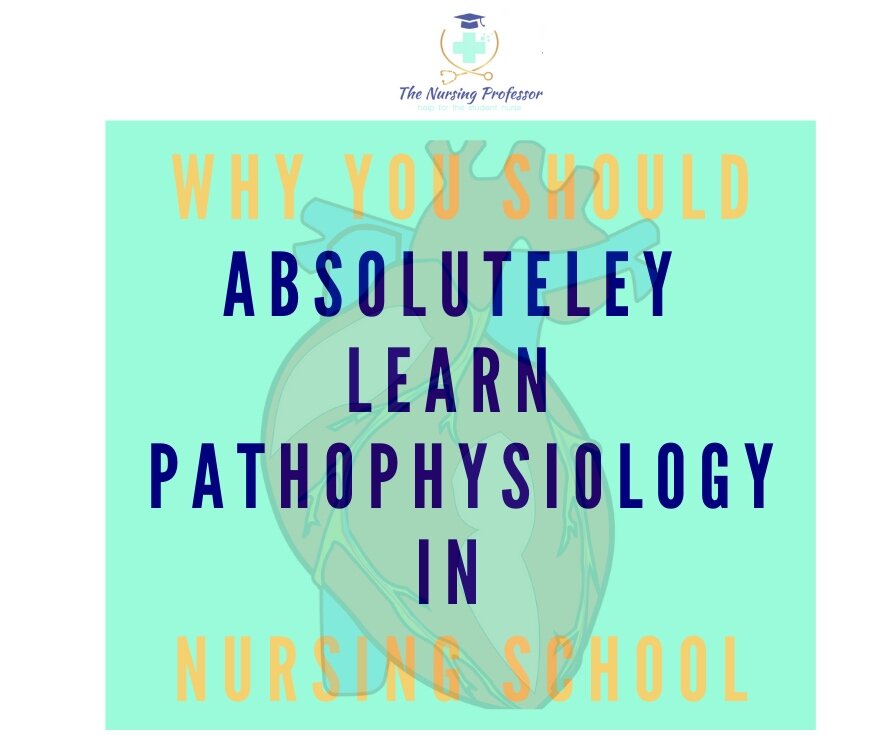Understanding the pathophysiology of a disease process can seriously help you understand everything from clinical manifestations, expected outcomes, and treatment for your patient
I hear plenty of nursing students, and sadly even nursing professors, say that knowing the pathophysiology is not that important and you can just memorize whatever you need to know.
…you can probably get by with memorization, at least for a while…
…but hear me out…
If you can understand what is happening within the body…it is then so easy to understand what our patient will look like (signs and symptoms), what we should be doing to help them (interventions, procedures, medications, etc.), what our goals of treatment should be (resolve the problem)….see where I am going with this.
Let’s look at a heart attack for instance…
You can memorize…
Clinical manifestations: chest pain possibly radiating to back/neck/jaw/arm, SOB, diaphoresis, n/v, etc.
Diagnostics: cardiac markers / troponin; Cath, etc.
Treatment: move it mona….
…or…
You can UNDERSTAND that when your patient is experiencing a heart attack, they have a blockage (be it complete or incomplete) to their coronary vessels - the blood vessels feeding the heart muscle.
And that this blockage results in decreased blood flow (and thereby decreased oxygen and nutrients to the heart).
The demand for oxygen has not decreased…yet the oxygen supply to the heart has dramatically decreased, so we get ischemia…
…our body senses this lack of oxygen, so the heart starts pumping more quickly to make up for the loss of oxygen….
but, since the heart is not being fed enough oxygen, despite the fact that it is actively working very hard to make up for that problem, it is in essence making the supply and demand problem worse and creating more problems (signs and symptoms) within the patient…
we understand that given the increased heart rate and decreased oxygen, our patient will exhibit dyspnea/shortness of breath, tachypnea (they start breathing faster in an attempt to make up for the lack of oxygen), chest pain (because ischemia causes cell death which hurts that part of the body), tachycardia (remember we are attempting to pump faster to get oxygen more quickly to deliver to the body), anxiety (because wouldn't you be internally freaking out if you couldn’t get enough oxygen and felt like an elephant was sitting on your chest), diaphoresis, dysrhythmia (due to the lack of coronary blood flow/oxygen)…
If we know what is actually going on in the body, truly understand the pathophysiology of the problem, then we can use our critical thinking skills to determine what needs to be done to help the patient.
Then it is easy to identify interventions that will help move the patient in a better direction…
apply oxygen
confirm issue and monitor - EKG and heart monitor
IVs (so we can give meds) and draw labs (troponin, cardiac markers)
medications: nitroglycerin (to open the coronary arteries); morphine (to relieve pain and dilate arteries), aspirin (inhibit further platelet aggregation)
restore coronary artery circulation (i.e. PTCA, bypass, thrombolytics)
keep the patient calm in the meantime - we need them to relax as much as possible - decrease oxygen demand, increase supply
I hope this exercise has helped you to see the importance and shown you exactly how it can help you, not only in nursing school, but as a nurse when you are face to face with this situation or one like it.
You will certainly have plenty of things in nursing school that you will have to memorize, and others for which mnemonics are simply very handy (like the one included above), but please believe me when I say that to be a great nurse you really need to know your pathophys!
For more awesome resources to help you THRIVE in Nursing School, check out our membership, RN School!




